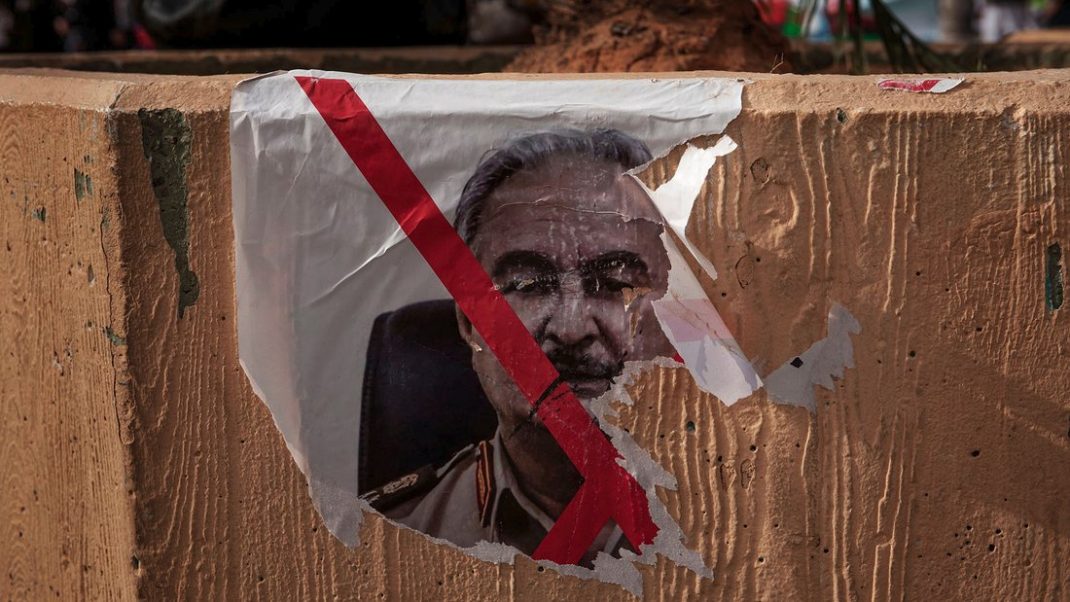 In a long and exclusive interview with the eastern-based The Libyan Address Journal, Khalifa Hafter, commander of the mainly eastern-based Libyan National Army (LNA), put forward his vision for Libya and repeated his motivation for launching his military attack on Tripoli on 4 April.
In a long and exclusive interview with the eastern-based The Libyan Address Journal, Khalifa Hafter, commander of the mainly eastern-based Libyan National Army (LNA), put forward his vision for Libya and repeated his motivation for launching his military attack on Tripoli on 4 April.
Hafter gives very few interviews, and even less to Libyan media. However, it seems he was keen in this wide-ranging interview to put forward his vision beyond the war on Tripoli. He gave some insights into his thinking and his reading of the Paris, Palermo and Abu Dhabi meetings.
Hafter insisted that there needs to be a political solution and that hutcomes of e was a democrat and that he wanted to hold democratic elections – but only after ridding Tripoli of its ‘‘Islamists and militias’’.
On Faiez Serraj’s peace initiative he says it lacks ‘‘seriousness’’ and does not address the ‘‘root causes of the crisis’’.
On the European position on Libya, Hafter said Europe’s position remains important for him. He said Europe should understand the longing of the Libyan people for changing their reality, and for exiting this crisis, and that such change begins with ‘‘the war on terror, the dismantling of militias, and the ending of this phase of the hijacked authority (referring to the Faiez Serraj-led Presidency Council and Government of National Accord) that lacks proper authorization by the people’’.
However, Hafter said he did not see this changing of Libyans’ reality happening purely through the military operation launched on Tripoli. He insisted that Libya’ssolution must be through the political track, and with the participation of all Libyans. The Libyan people will find solutions for using dialogue and discussion, through peaceful, political, and democratic means, he explained.
The military operation, he continued, takes aim at ‘‘inexecrable realities that could not be addressed by any other means’’.
These include ‘‘the presence and spreading of terrorist leaders, and their recruitment activities through cells inside Tripoli, the presence and spreading of militias, and their control over the funds that belong to the Libyan people at the Central Bank of Libya, as well as their practice of highway robbery, kidnapping, and blackmail.
And the growing of activities by criminal groups, organized-crime gangs who trade in human beings, and the smuggling of oil and fuels, and also the presence of groups of politicized Islam that sabotage political life and spoil its atmosphere, and even implement foreign agendas that conflict with the interests of the Libyan people.
This is the part that we aim at with our military operation’’, he said.
On the Tripoli fighting operations, he said Libyans should not to pay attention to the rumours that claim that we may withdraw or even think of stopping at this stage. ‘‘Military operations will NOT stop before we accomplish all our objectives. After finishing the military task in Tripoli, (his forces) will be devoted to the protection of borders, shores, and skies.
The atmosphere for political work and discourse, with all its details will be more conducive. Such work and discourse will then have better circumstances for success. That contrasts with the circumstance of the previous eight years. The military operation will result in the removal of the factors that led to the failure of the political track, and that led to all the economic, social, legal, and security catastrophes’’.
After liberating Tripoli, ‘‘we will enter a transitional period that is, this time, both clear and disciplined. It is important that during this transitional period several basic tasks are accomplished, in order to prepare the ground for the permanent phase’’. This involves ‘‘the dismantling of all militias, disarming them, and giving guarantees to those who cooperate in that regard.
The dismantling of all bodies (the Presidency Council, the Government of National Accord and the High State Council) generated by the Skhirat Accord (the Libyan Political Agreement signed in the Moroccan city of Skhirat in 2015), which has not only expired and failed in finding an exit from the crisis but actually created several other crises’’.
Hafter continued, adding that the next phase is ‘‘a phase that is permanent and normalized, and upon which the state can stabilize, so it can launch into reconstruction, development, and the removal of the debris of long years of stagnation’’.
Amongst the tasks of such a phase are ‘‘the formation of a new constitutional committee, and a proposed referendum law, rebalancing the oil sector and its revenues, addressing the challenges facing people, and making their lives easier, and especially addressing the liquidity crisis, and commencing the unification and proper management of state institutions, after years of chaotic divisiveness caused by previous bodies, through their illegal struggle for power, and their reneging on commitments, and their being manipulated by militias from before and after the ‘Fajr Libya’ (Libya Dawn 2014 Tripoli coup) terrorist operation that was launched by the Muslim Brotherhood.
The whole world now knows that it was that operation that divided the institutions of the state, and led to the catastrophes that Libya has been suffering’’.
‘‘We will have a transitional phase that will be managed by a national unity government’’, continued Hafter, ‘‘that will immediately start working upon liberating Tripoli. And if, for any temporary logistical and security reasons, it has difficulties, it may also start working from any other city like Benghazi, or any other stable and secure city in the West, East, or South, until Tripoli is ready for moving in. As you know, we do not discriminate between cities or regions. We see a single and unified Libya’’.
Asked about those who doubt Hafter’s real intentions behind attacking Tripoli and accuse him of being a Qaddafi-like dictator in disguise, he said ‘‘They should first raise doubts about those who flipped on democracy using arms and came back to power through the militias of ‘Fajr Libya’, duly designated as terrorist by the Parliament. They occupied the capital and imposed a government with the force of arms.
‘‘It is more appropriate’’, he continued, ‘‘for such people to raise doubts about the Presidential Council that refused to hand over authority after the Skhirat Accord expired three times, and after the passing of many legal judgments against it and against its decrees, because it has no legal status, and its alliance with militias to stay in power.’’
‘‘They should raise doubts’’, he added ‘‘about those who empower terrorist groups and militias and grant them safe havens and money and allow them to destroy the state and its institutions. As for the (Libyan National) Army (LNA), it is the same Army that protected the last elections in 2014, and that committed to all international initiatives regarding new elections.
The Army is the one who will guarantee and protect the establishment of the new Libyan state, God willing. It is not the army who failed to meet its commitments regarding elections which were supposed to happen in 2018, and which were then postponed to the beginning of 2019’’.
‘‘No, it was the Presidential Council that withheld funding of the (High National) Election Commission (HNEC), as per its chairman’s own statements, and that also failed to protect it and allowed it to be destroyed by terrorists.
It also objected to the Referendum Law and created difficult predicaments regarding constitutional foundations. At other times, it used the excuse of security circumstances and a host of other excuses that they kept coming up with’’.
Hafter claimed that ‘‘Elections were our demand from the beginning and we agreed to them, and we demanded them in the Abu Dhabi I and II meetings, in Paris I and II, and in Palermo Italy as a solution for the legitimacy crisis. This was the demand of the majority of Libyans, as per opinion polls.
But, what happened? What happened is that this government which we regarded as an enlightened government of national accord, returned to where its militias were, and where the non-constitutional and so called ‘State Council’ (controlled by the Muslim Brotherhood, lately classified by the Parliament as a terrorist organization) was, and reneged on everything we had agreed upon.
In summary, they are the obstructers of the process using all sorts of chaotic excuses, as explained.
On the international position on Libya, Hafter said ‘‘The international stance is largely supportive of the Army (LNA), directly and indirectly. Those who do not support us, still sent us assurances that they understand the stance of the Army and its movements’’ and that his ideas for the phase beyond the liberation of Tripoli, ‘‘do not conflict with the common interest of these countries with Libya and do not in any way obstruct them’’
On the position of regional and neighbouring countries, Hafter said ‘‘We believe that, day by day, they have started to understand the nature of the movements of the Army, and its contribution in supporting the people in their striving to exit from the current suffocating situation to a transitional phase, and then to a permanent phase that ends all suffering’’.
On Faiez Sarraj’s latest peace initiative Hafter said that he did ‘‘not believe that he (Serraj) has anything to say. He is a shaken man, and his decision is not in his hand. I have experienced dealing with him and have come to know him well over the past several years, and I have talked to him directly, as you know.
Truly, he does not know what he wants, and is not able to sign any agreement. He always unconsciously gives you the impression that he is terrified of something unknown, intensely and to an indescribable extent’’.
‘‘Anyway’’, he continued, ‘‘the initiative, in addition to lacking any seriousness and any clauses that address the causes of the crisis, does not actually belong to Sarraj, but is merely an echo of the repetitive discourse of Ghassan Salame. Initiatives have no meaning unless they are brave and carry clear clauses that address the causes of the crisis and its very roots. Therefore, his initiative is of no value and our response to it is the same as our response to what Salame has said before’’.
‘‘I repeat’’, Hafter stressed, ‘‘we are not against political solutions, nor against the democratic process, nor against elections. On the contrary, we see elections as the best path forward, as in all countries of the world. The ABC of democracy is arbitration exclusively through the ballot box, not arbitration through an alleged ‘consensus’ that has been forcibly imposed upon Libyans in the lobbies of hotels.
We believe all these values and institutions of a civil and modern state cannot live in the shadow of terrorist control and groups like Al-Qaida, the (disbanded) Libya Islamic Fighting Group (LIFG), the Muslim Brotherhood, militias and gangs of organized crime, smuggling, kidnapping, and the predators of public funds’’.
On UNSMIL head Ghassan Salame, Hafter said that he respected him in general. ‘‘However, lately, his information seems truncated and he does not give the Army its due. His reports to the Security Council and some of the confusing reports of his mission make us believe that cooperating with him is of no benefit. I frankly also told him that I am still hoping that cooperation between us can continue and develop towards prospects of resolving the crisis, and that I would not like to treat him like previous envoys’’.
***
Sami Zabtia – Editor of Libya Herald
_________





